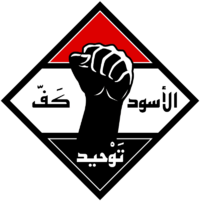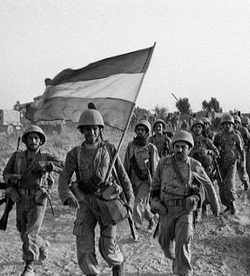Black Hand (Zorasan)
| Black Hand | |
|---|---|
| اليد السوداء al-Yad as-Sawdāʾ | |
 Emblem of the Black Hand | |
| Founders | Malik al-Majid (alleged) Mustafa al-Kharadji (suspected) |
| Leaders | 1953-1969 (unknown) Ezatollah Ashtari (1969-1977) Abdul-Nazir Jadid (1977-1979) |
| Dates of operation | 11 April 1953 - 30 October 1979 |
| Motives | Unification of Zorasan Overthrow of pro-Euclean Badawiyan governments |
| Headquarters | Unknown |
| Active regions | Zorasan, Tsabara |
| Ideology | Sattarism Pan-Zorasanism Anti-colonialism |
| Allies | |
| Opponents | Emirate of Irvadistan (1953-1968) |
The Black Hand (Badawiyan: اليد السوداء; al-Yad as-Sawdāʾ), officially known as the Black Hand of National Liberation (اليد السوداء للخلاص الوطني; al-Yad as-Sawdāʾ lil-Khalās al-Wataniyy) was a militant Sattarist and Pan-Zorasanist group established in 1953, until its dissolution in 1979. The Black Hand played a prominent role during Zorasani unification, being responsible for numerous major terror attacks, assassinations and other operations against the Badawiyan governments opposing the unification of Zorasan.
Origins
Little is known about the origins of the Black Hand, however, the two most prominent possibilities is that of the Malik al-Majid testimony that the Black Hand was formed out of the Popular Resistance of Khazestan at the behest of Khazi revolutionary leader Mustafa al-Kharadji, while the other possibility is that the Black Hand was formed after the Khazi Revolution in secret by Al-Kharadji and his associates.
Malik al-Majid and the PRK
Information on the Black Hand has been difficult to obtain due to the restrictions on freedom of information in Zorasan. However, in the post-unification period of the early 1980s, hundreds of individuals came out to the national Zorasani press to claim they were members of the Black Hand. Among the most reliable sources are those that belong to the Heroes of Husaybah, a group of armed gunmen who prevented a public mass execution by firing squad in the southeastern Khazi city of Husaybah. The leader of the group, Malik al-Majid told Ettehad newspaper in 1983 that after saving the Husaybah condemned, he and his comrades formed the Popular Resistance of Khazestan in early 1950. The PRK rapidly grew in Abassiya to boast over 3,000 members, though only a "vanguard core" were armed with guns of various types, the remaining number were tasked with civil disobedience in the ultimate aim of overthrowing the Khazi monarchy. The PRK would go on to stage hit and run attacks against government personnel in Abassiya and its surrounding environs, gaining notoriety nationally by 1951. The same year, representatives from the Khazi Revolutionary Resistance Command met with the PRK to discuss cooperation against the monarchy. Al-Majid explained that the PRK immediately accepted the KRRC's proposal, knowing that doing so they could secure supplies from neighbouring Pardaran. So impressed by the PRK, that the KRRC leader, Mustafa al-Kharadji once seizing power in wake of the Khazi Revolution, asked Al-Majid to form a "special actions group" that would operate behind enemy lines to destabilise the remaining monarchies. Between 1952 and 1953, Al-Majid and his 3,000 supporters were trained in militant action, and educated in the nature of their mission. The training according to al-Majid took place in various training facilities in Pardaran, far from the Zorasani-Badawiyan states to the east.
Al-Majid's testimony to Ettehad was corroborated by numerous individuals, including several veteran KRRC officials who would go on to serve in the government of the Union of Khazestan and Pardaran. When asked to confirm Al-Majid's story, the Zorasani government refused to be drawn into debates or discussions of the Black Hand, repeating the same line that it was an independent popular force comprised of "revolutionaries dedicated to the ideal of Zorasan."
Mustafa al-Kharadji and the Black Brigade
The other prominent "origin story" of the Black Hand centers around Mustafa al-Kharadji, the leader of the Khazi Revolutionary Resistance Command and the Khazi Revolution. Al-Kharadji stands as one of the most pivotal figures in Zorasani unification, as it was his movement that swayed the Pardarian Revolutionary Resistance Command in wake of the Pardarian Civil War to adopt Pan-Zorasanism, as a result, he rapidly found himself elevated to be the ideology's key Badawiyan figure. As the noted unification historian, Ghassan Nakhabi noted in 1999, "Al-Kharadji in the end was the more committed soul of Pan-Zorasanism. It is him that unleashed the Arduous Revolution from the cautious worries of the Pardarian and forged Pan-Zorasanism into the success it is today." In the immediate aftermath of the Khazi Revolution in 1953, al-Kharadji arranged a meeting of senior KRRC figures to discuss unification with Pardaran, but according to some diary entries of figures in attendance, Al-Kharadji proposed the creation of a "specalist movement" that would export the Khazi revolution to the other Badawiyan states of Zorasan and achieve unification through popular uprisings.
The difference between the Al-Kharadji and Al-Majid accounts is that the group selected to form the foundation of the Black Hand was the Black Brigade, an elite force of partisans subordinate to Al-Kharadji himself. The Black Brigade was comprised of those who had answered al-Kharadji's call in fighting in the Pardarian Civil War alongside the PRRC. The Black Brigade's leader was al-Kharadji in more than just name, with their return to revolutionary Khazestan, al-Kharadji had sole disrection over its actions and directions. As such, the Al-Kharadji account if correct, would place him as the sole commanding authority over the Black Hand, while completely removing Malik al-Majid from the organisation.
History
Early stages (1953-1960)
First Black Hand radio broadcast message, Voice of the Motherland, 13 January 1953
